
In Cultivating Knowledge anthropologist Andrew Flachs shows how rural farmers come to plant genetically modified or certified organic cotton, sometimes during moments of agrarian crisis. Interweaving ethnographic detail, discussions of ecological knowledge, and deep history, Flachs uncovers the unintended consequences of new technologies, which offer great benefits to some—but at others’ expense. Flachs shows that farmers do not make simple cost-benefit analyses when evaluating new technologies and options. Their evaluation of development is a complex and shifting calculation of social meaning, performance, economics, and personal aspiration. Only by understanding this complicated nexus can we begin to understand sustainable agriculture.
By comparing the experiences of farmers engaged with these mutually exclusive visions for the future of agriculture, Cultivating Knowledge investigates the human responses to global agrarian change. It illuminates the local impact of global changes: the slow, persistent dangers of pesticides, inequalities in rural life, the aspirations of people who grow fibers sent around the world, the place of ecological knowledge in modern agriculture, and even the complex threat of suicide. It all begins with a seed.
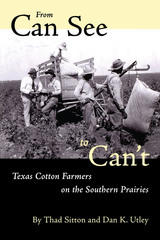
Cotton farming was the only way of life that many Texans knew from the days of Austin's Colony up until World War II. For those who worked the land, it was a dawn-till-dark, "can see to can't," process that required not only a wide range of specialized skills but also a willingness to gamble on forces often beyond a farmer's control—weather, insects, plant diseases, and the cotton market.
This unique book offers an insider's view of Texas cotton farming in the late 1920s. Drawing on the memories of farmers and their descendants, many of whom are quoted here, the authors trace a year in the life of south central Texas cotton farms. From breaking ground to planting, cultivating, and harvesting, they describe the typical tasks of farm families—as well as their houses, food, and clothing; the farm animals they depended on; their communities; and the holidays, activities, and observances that offered the farmers respite from hard work.
Although cotton farming still goes on in Texas, the lifeways described here have nearly vanished as the state has become highly urbanized. Thus, this book preserves a fascinating record of an important part of Texas' rural heritage.
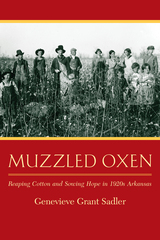
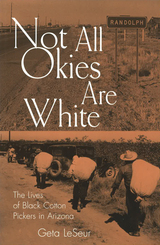
Vividly revealing the challenges faced by a group of migrant workers who eventually formed the multiracial town of Randolph, Arizona, Not All Okies Are White is a brilliant, spellbinding celebration of the resilience and adaptability of people too often ignored by history texts.
Recognizing the black exodus to the American West as an overlooked but integral chapter in American history, Geta LeSeur fills the void by extending her research beyond the Mississippi River and the Mason-Dixon line, examining close-up the personal lives of third- and fourth-generation descendants of pre-Emancipation blacks. In this first full-length study to explore the migrant life of any nonwhite group within the United States and the first to focus specifically on a primarily black town in the Southwest, LeSeur deftly uncovers the stepping-stone pattern of black movement west of the Mississippi into Arkansas, Oklahoma, and Texas, and consequent migrations to Arizona and California imposed by economic and social conditions.
Not All Okies Are White recaptures the ways of life for black migrant workers, as well as Hispanics and Native Americans, in the first half of the century through richly detailed interviews of the families of Randolph's founders. Through the words of each narrator, these personal stories recount work experiences and survival strategies, offering new insights into the people's relationship to the land. The narratives reveal a creative tension between place and identity, movement and migration. LeSeur provides a historical, cultural, and literary context for the oral histories by incorporating news articles, information culled from historical society archives, analyses of films and novels, advertisements, and photographs.
An innovative blend of history telling and literary analysis, Not All Okies Are White describes LeSeur's acquaintance with and growing involvement in the lives of the residents of Randolph and surrounding farm communities. The result is a highly accessible cross-disciplinary study that will appeal to scholars and general readers interested in oral history, African American history, multicultural studies, and women's studies.

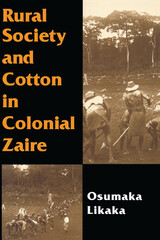
As local plots of food crops grown by individual households gave way to commercial fields of cotton, a whole host of social, economic, and environmental changes followed. Likaka reveals how food shortages and competition for labor were endemic, forests were cleared, social stratification increased, married women lost their traditional control of agricultural production, and communities became impoverished while local chiefs enlarged their power and prosperity.
Likaka documents how the cotton regime promoted its cause through agricultural exhibits, cotton festivals, films, and plays, as well as by raising producer prices and decreasing tax rates. He also shows how the peasant laborers in turn resisted regimented agricultural production by migrating, fleeing the farms for the bush, or sabotaging plantings by surreptitiously boiling cotton seeds. Small farmers who had received appallingly low prices from the cotton companies resisted by stealing back their cotton by night from the warehouses, to resell it in the morning. Likaka draws on interviews with more than fifty informants in Zaire and Belgium and reviews an impressive array of archival materials, from court records to comic books. In uncovering the tumultuous economic and social consequences of the cotton regime and by emphasizing its effects on social institutions, Likaka enriches historical understanding of African agriculture and development.
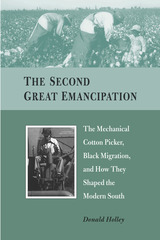
In The Second Great Emancipation, Donald Holley uses statistical and narrative analysis to demonstrate that farm mechanization occurred in the Delta region of Arkansas, Louisiana, and Mississippi after the region’s population of farm laborers moved away for new opportunities. Rather than pushing labor off the land, Holley argues, the mechanical cotton picker enabled the continuation of cotton cultivation in the post-plantation era, opening the door for the civil rights movement, while ushering a period of prosperity into the South.
READERS
Browse our collection.
PUBLISHERS
See BiblioVault's publisher services.
STUDENT SERVICES
Files for college accessibility offices.
UChicago Accessibility Resources
home | accessibility | search | about | contact us
BiblioVault ® 2001 - 2025
The University of Chicago Press









